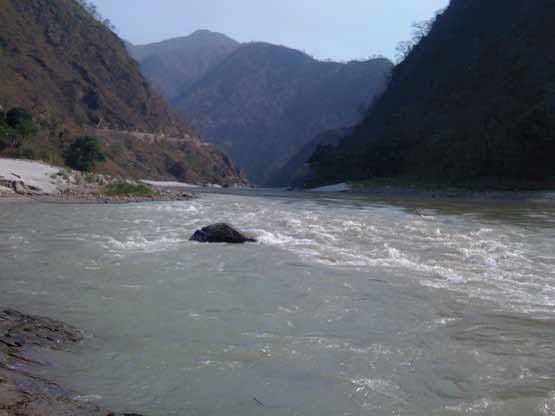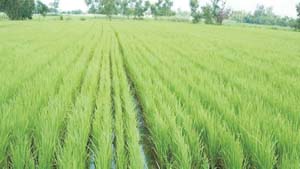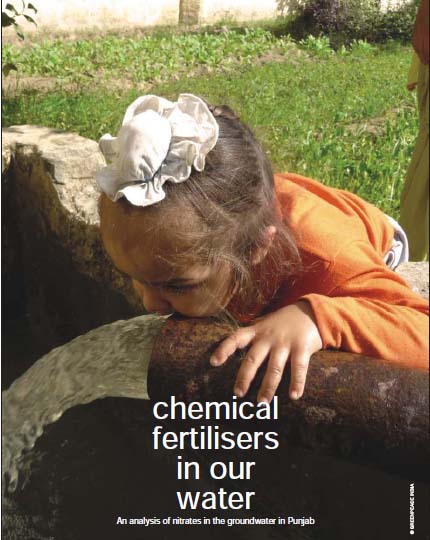/regions/northern-plains
Northern Plains
The impacts of water infrastructure and climate change on the hydrology of the Upper Ganges river basin – A research report by IWMI
Posted on 18 Dec, 2011 07:03 PM The Ganges river system originates in the Central Himalayas, and extends into the alluvial Gangetic Plains and drains into the Indian Ocean at the Bay of Bengal. In the upstream mountainous regions, hydropower is the main focus of development with mega and micro projects either under construction or being planned in both Nepal and India.
The Ganges river system originates in the Central Himalayas, and extends into the alluvial Gangetic Plains and drains into the Indian Ocean at the Bay of Bengal. In the upstream mountainous regions, hydropower is the main focus of development with mega and micro projects either under construction or being planned in both Nepal and India.
After the main river channel reaches the plains, it is highly regulated with dams, barrages and associated irrigation canals. All this infrastructure development and abstractions affects the river’s flow regime and reduces flows, which, in turn, impacts downstream water availability, water quality and riverine ecosystems. Furthermore, there are concerns that climate change is likely to exacerbate the water scarcity problem in the Ganges Basin. Therefore, modeling the hydrology of the basin is critical for estimation, planning and management of current and future water resources.
Traditional water bodies of Delhi
Posted on 18 Dec, 2011 01:56 PMSohail Hashmi, an author, film-maker, one of the founders of the Safdar Hashmi Memorial Trust (SAHMAT) and a true Dilliwala on 5 December 2011 at the India Habitat Center. The presentation woven around photographs of the city's step well
Encephalitis deaths in India - The same story of poverty, neglect, disaster and disease, how long will this continue ?
Posted on 02 Dec, 2011 10:15 AMGuest post by : Aarti Kelkar-Khambete
Workshop on rainwater harvesting in Meerut’ - Janhit Foundation's e-newsletter of March 2011
Posted on 11 Nov, 2011 09:29 PMContent courtesy: Janhit Foundation
Zero tillage in the rice-wheat systems of the Indo-Gangetic plains - A review of impacts and sustainability implications by IFPRI
Posted on 31 Oct, 2011 06:49 PM This paper by the International Food Policy Research Institute (IFPRI) reviews the success of zero-tillage wheat in the rice-wheat systems of the Indo-Gange
This paper by the International Food Policy Research Institute (IFPRI) reviews the success of zero-tillage wheat in the rice-wheat systems of the Indo-Gange
Chemical fertilizers in our water - An analysis of nitrates in the groundwater in Punjab by Greenpeace
Posted on 31 Oct, 2011 09:00 AM The level of nitrate in drinking water was tested from groundwater artesian wells located within farms and surrounded by crops (mostly rice and wheat rotations).
The level of nitrate in drinking water was tested from groundwater artesian wells located within farms and surrounded by crops (mostly rice and wheat rotations).
Nitrate pollution in groundwater is associated with nitrogen loads in the environment. In urban areas, it is associated with sewage and in agriculture areas, with livestock sources and nitrogen fertiliser inputs. Nitrate pollution in drinking water can have serious health impact on humans, especially for babies and children. The most significant potential health effects of drinking water contaminated with nitrate are the blue-baby syndrome (methemoglobinemia) and cancer.
Establishment of missing stream link between the Markanda river and the Vedic Saraswati river in Haryana – A paper in Current Science
Posted on 05 Aug, 2011 04:11 PMThis paper in Current Science attempts to establish a missing stream link between the Markanda river and the Vedic Saraswati river in the plains of northern Haryana based on geoelectrical resistivity surveys. Resistivity surveys in the Gangetic Plains around Pehowa region in Haryana, have revealed different subsurface geological formations composed of fine, medium and coarse sand with gravel. Resistivity section between the lower part of the Markanda basin and the Saraswati river around Pehowa region indicates the presence of buried sand bodies connecting the two rivers.
Fazilka citizens protest against planned encroachment on ecosensitive Badha lake wetland by Punjab Urban Development Authority (PUDA)
Posted on 21 Jul, 2011 04:16 PMForwarded to the portal by: Graduates Welfare Association, Fazilka
A natural system and an agricultural philosophy - A small-holder farmer in Punjab turns his land from a lifeless, debt ridden farm into a healthy, productive and profitable one - A film by The Source Project
Posted on 13 Jul, 2011 12:24 PMArticle and Video courtesy: The Source Project
Development flows from the barrel of a gun – A documentary by AKHRA
Posted on 08 Jul, 2011 10:37 AM
Directed by Biju Toppo and Meghnath, Hindi with English subtitles, 58 mins